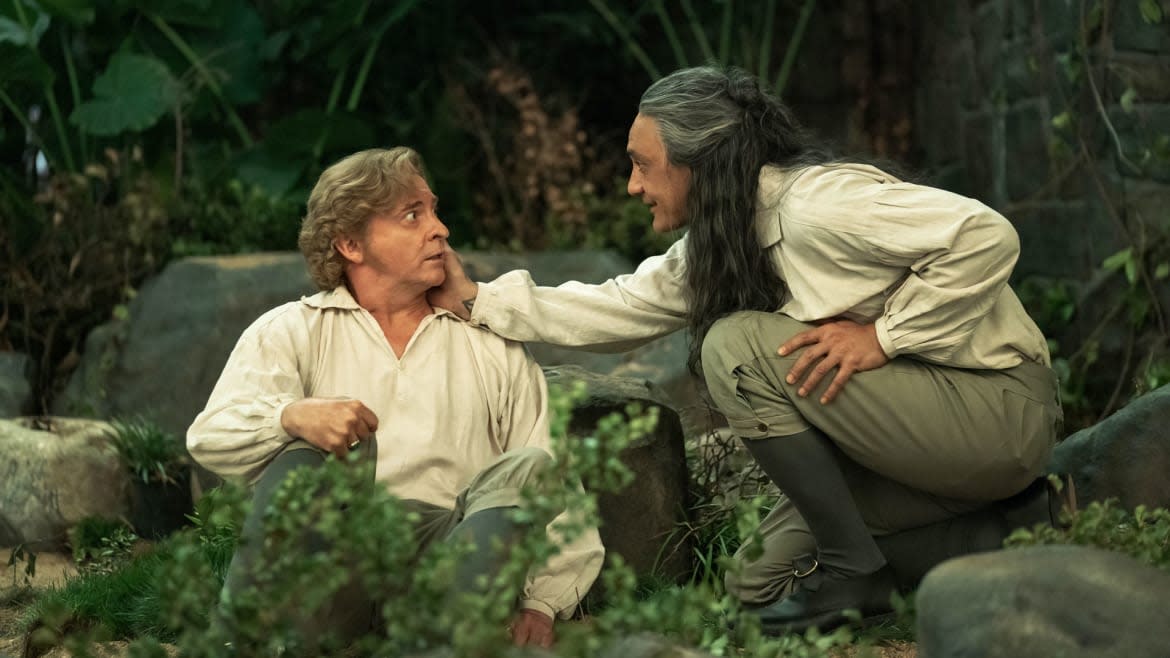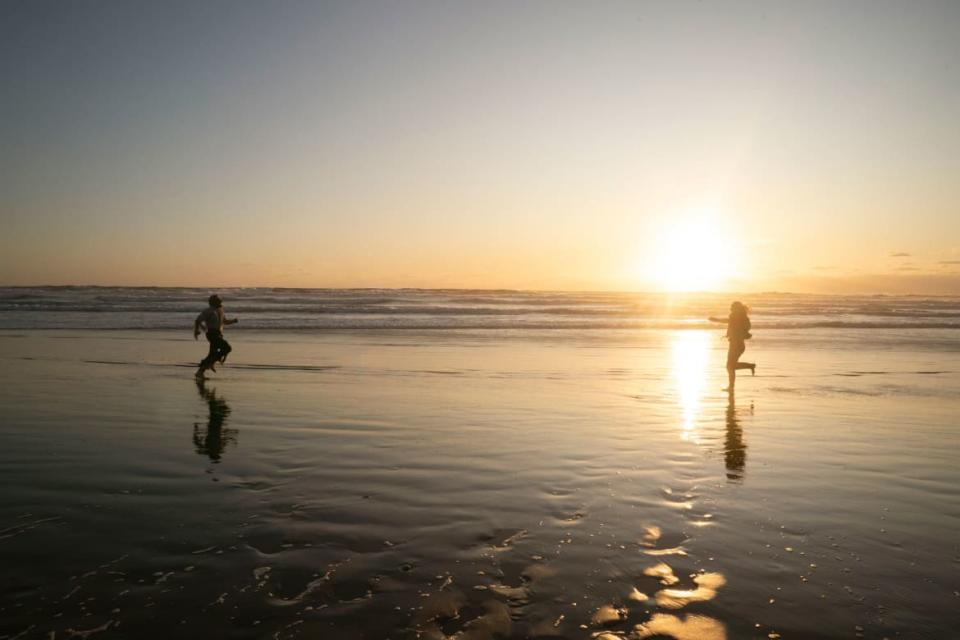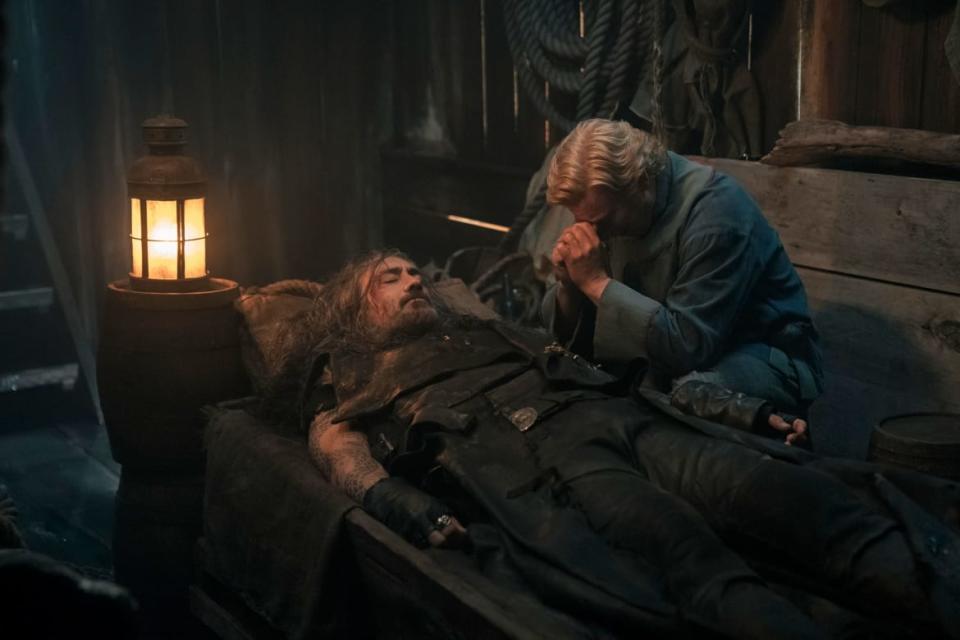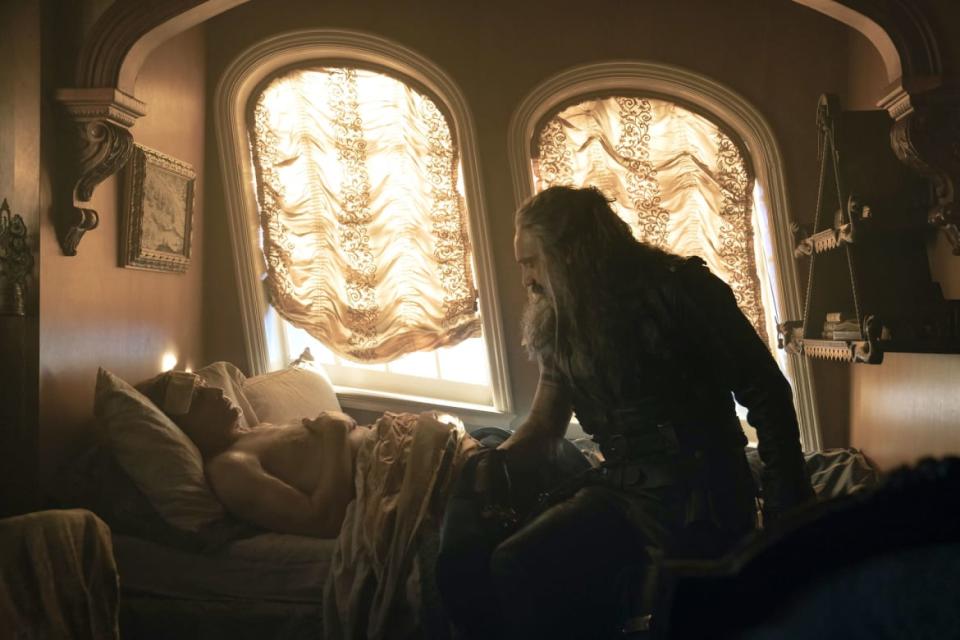Queer Fans Love ‘Our Flag Means Death’—and It Loves Them Back

Imagining what could have happened if the creator dared to dream bigger is fandom’s driving ethos. Whether or not the people behind the scenes expected to have the most passionate bloc of their audience fixate on a queer romance that may or may not have been intentional is irrelevant. When queerness is still on the periphery of society, it’s unsurprising that the relationships fans obsess over and seek to actualize are predominantly queer.
Our Flag Means Death, whose second season is now airing on Max, doesn’t require its fans to dream of the queer possibilities. Instead, it’s that rare breed of work that raises the romantic subtext—typically buried under bromatic jokes or subtle ambiguity—to undeniable text from the very beginning. And when fandoms and creative teams are both on the same page of the same unabashedly queer love story, as is the case for Our Flag, the experience is nothing short of sublime.
Queer media, particularly TV, has entered something of a golden age since the aughts. There are the early mainstream pioneers like The L Word and Will and Grace; the wholesome coming-of-age romcoms like Heartstopper and Love, Victor; and the adaptations taking beloved stories one big step further, like Interview with the Vampire, Good Omens, and Hannibal. There are gritty, inspired-by-real-life dramas like Orange is the New Black and Pose, murderous thrillers like Killing Eve and Orphan Black, raunchy comedies like What We Do in the Shadows and Sex Education, and many more stories featuring queer leads with fully fleshed-out storylines.
‘Our Flag Means Death’ Charts a Course for an Incredible Season 2
But even among these big names, this silly gay pirate show stands out by taking what these shows do best and fulfilling a particular need few have met before. The reasons are myriad: It refuses to use queer subtext as a prop or ransom for audience loyalty. It eschews the will-they-won’t-they dance that positions love as an end rather than a beginning. It defies the trope that you must renounce your past in order to move on. It scoffs at the notion of a ceiling for complex queer characters and relationships in a single show. And it demonstrates that depicting the experiences of queer people (and, just as importantly, people of color) don’t always have to center brutality and trauma—that healing can come from making acceptance the norm and bigotry the butt of ridicule, and that being kind doesn’t necessitate being passive.

As a show that didn’t explicitly market itself as “LGBTQ,” one of Our Flag’s most striking aspects is how it subverts the way this genre typically approaches romance. You could argue that the love story begins when Stede Bonnet (Rhys Darby) is recognized as the pirate he wants to be—while three-quarters of the way dead—by none other than the dread Blackbeard (Taika Waititi). Or you could say it begins when Blackbeard, a.k.a Ed Teach, is seen, for the first time, as someone who deserves softness and finery by the epitome of softness and finery himself. Or when Stede comforts Ed as he curls up in a bathtub reliving his worst memories. Or when Stede picks roasted snake out of Ed’s beard. Or when Ed gives himself up to the British to save Stede’s life. Or when…
You get my drift. There’s an entire season’s worth of scenes that make up the foundations of a fandom: moments of intimacy and connection that gesture toward the possibility of something more. These are the planks and rigs of a ship sturdy enough to outpace the fleet of fanworks chasing such moments down until feelings are admitted, consummated, and set sailing off into the sunset. In hindsight, Our Flag was undoubtedly heading in this direction. But it wasn't until the most incontrovertible on-screen gesture of romance happened—a kiss—that fans heaved a sigh of relief. Because fandom, for all its capacity to will alternative universes into being, is inherently bound to the media from which it springs, and many have only ever cast queer love as bait.
But with Our Flag, most fans aren’t at all concerned about what direction the story will take. And the key difference is that they trust the creators wholeheartedly.
How ‘Our Flag Means Death’ Became the Funniest Show on TV
For many queer fans, it’s a novel experience to interface with a creative team that is not only aware of exactly who the audience is and what they care about, but also proudly and vocally celebrates them. In interviews, producer and lead actor Taika Waititi has stated that he collects fan art on his phone. Vico Ortiz (who plays the nonbinary pirate Jim Jimenez) has shared that fan art encouraged them to get gender-affirming top surgery. Creator and showrunner David Jenkins once remarked that fan discussions are so spot-on, it was as if they had “been in the writers’ room.” And several queer actors on the show have expressed that the fandom has made them feel even more connected to the LGBTQ+ community.

Our Flag is one of the rare cases where fans and creators share the same vision for a given work. There are no calls for the figurative death of the overly originalist author, nor strict separation of the "canon" of the original work from the "fanon" interpretations of the audience. There is no need for fans to dig for subtext, because what they’ve been searching for has been on board with them all along—not as a blink-and-miss-it pantomime or a nothing-left-to-lose Hail Mary, but a queer love story that was intentionally, thoughtfully crafted from the beginning.
Our Flag presents fans with a vibrant world where everything is mostly beautiful and almost nothing hurts—at least, not yet. Fans can surmise the shape of the second act and the close of the third, even if they don’t know exactly how they’ll get there. But with full confidence in the creators, fans have the opportunity to stretch their imagination beyond tallying evidence and righting wrongs—and it makes for a fandom experience less a eulogy at a funeral of another buried gay, more a toast at the most extravagant and absurd cruise-ship wedding to ever grace the seven seas.
We are all on the same page of the same story, and the experiences of everyone involved is so much richer for it. Or, as Stede would say, treasure is the real treasure.
Rhys Darby: ‘Flight of the Conchords’ Should Avoid the Reboot ‘Trap’
Fandom, like being a pirate, is in many respects a very queer enterprise. It centers on abandoning the rules so you can survive; grabbing every scrap of home you can find and making it your own; sharing the spoils with the people who see and accept you for who you are and who you want to be. Or, in the words of the show’s pseudo-antagonist, Izzy Hands (Con O’Neill), it's about belonging to something—a something that, I believe, could be enough to help you fall back in love with life and the world.

I think often of the scene that first drew me into Our Flag: Stede asks his former wife, Mary (Claudia O’Doherty), what it feels like to be in love. Looking back at it now, I realize her response describes what the experience of being a part of a community a show like Our Flag creates can feel like. Because love, she tells him, is as easy as breathing. It’s understanding each other’s idiosyncrasies and seeing the charm in them. It’s exposing each other to new things and laughing a lot. It’s passing the time so well together.
To every queer fan out there: I hope you find that, too. I hope you can name it without fear. And I hope you will be embraced for that revelation, and all the wonder and joy it brings.
Get the Daily Beast's biggest scoops and scandals delivered right to your inbox. Sign up now.
Stay informed and gain unlimited access to the Daily Beast's unmatched reporting. Subscribe now.

